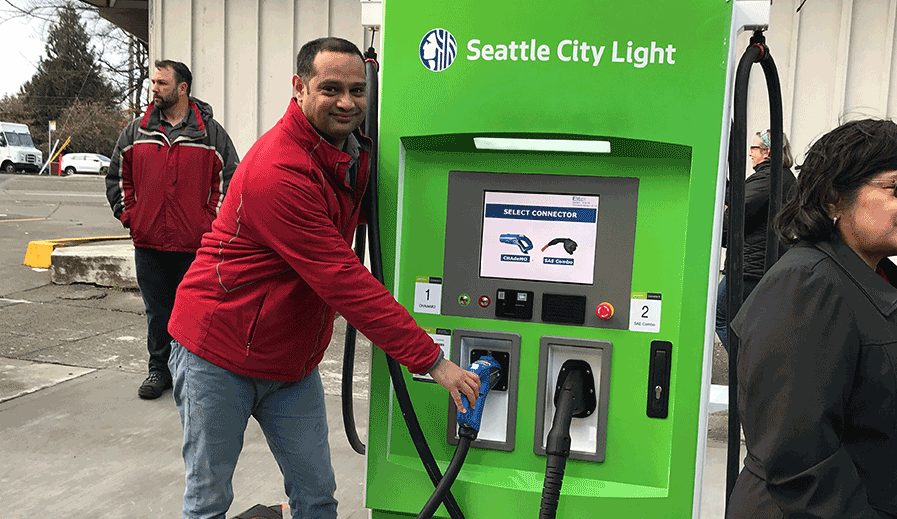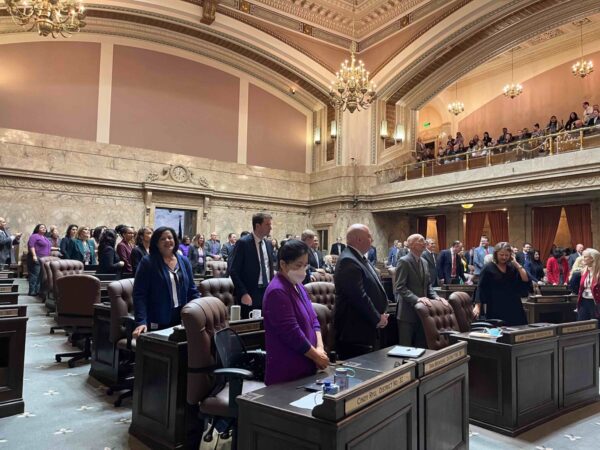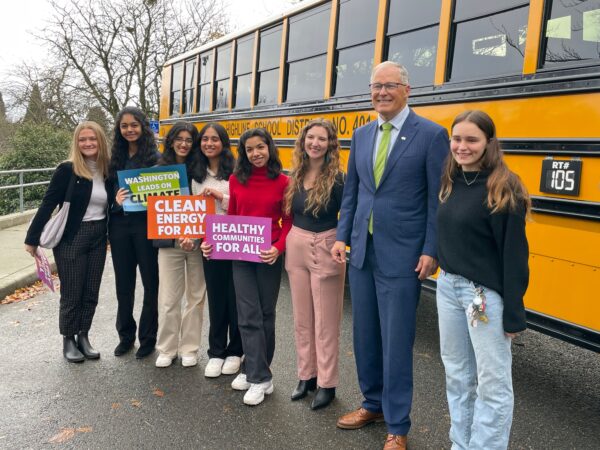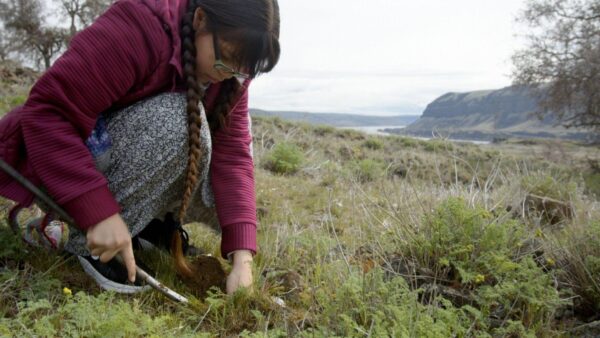And Seattle City Light is doing just that by putting its first two electric vehicle (EV) fast charging stations into service. This effort is part of the ambitious Drive Clean Seattle Initiative’s pilot project to boost the visibility and public use of EVs.
Seattle is committed to a bold and achievable goal of getting 30% of the personal cars in the city registered as all-electric by 2030.
In early 2018, Seattle kicked off this new era at an electric charging station. Located across the street from the popular Station coffee shop and half a block from the Beacon Hill Light Rail line, these chargers help paint the vision of a vibrant, pollution-free future. This site was chosen in part because it would attract public attention and was easy to access.
Seattle Mayor Jenny Durkan arrived at the opening event by pulling up to the curb in an all-electric, city-owned Nissan to charge up. “We will try to have electrification throughout the city so that our city vehicles, our buses, our taxis, our ride shares, and people’s personal vehicles can shift over from carbon to electric. One of the biggest contributors to our climate burden are vehicles,” Mayor Durkan said.
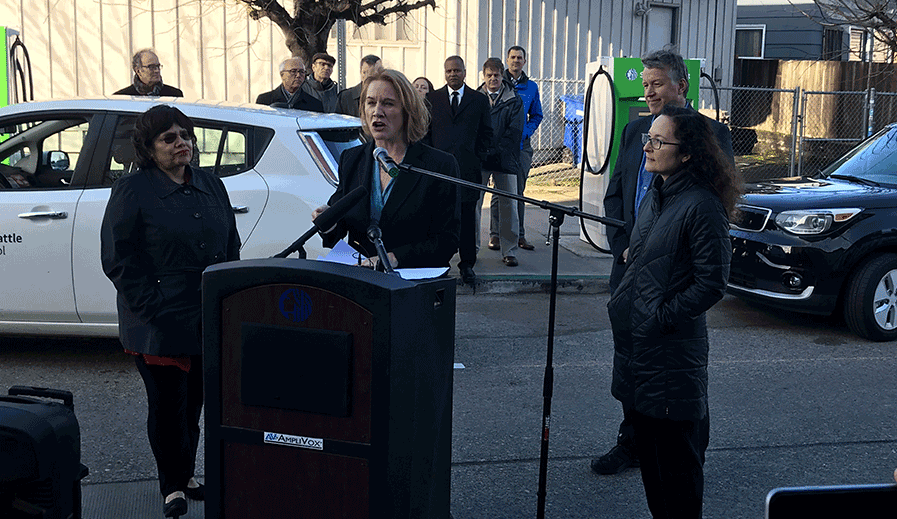
The opening of these two fast charging stations is just the start for the city. Seattle City Light will put 18 more EV fast charging stations into service by the end of this year. Seattle is committed to a bold and achievable goal of getting 30% of the personal cars in the city registered as all-electric by 2030.
It is inspiring to see such leadership from our state’s largest city. Government has an important role to play in making EV charging stations accessible across Washington by offering economic incentives and thoughtful, innovation-spurring regulations.
To expand the use of clean transportation fuels like electricity in every stretch of our state, WEC is a strong supporter of a bill that would establish a Clean Fuels Standard (CFS). This would decrease the amount of planet warming carbon pollution that is released by the fuels consumed by on-road transportation vehicles in Washington.
Thanks to other state policies, the number of EV charging stations in service in Washington is growing but to catch up with our carbon emission reduction targets, we need to rapidly accelerate our pace. In 2015, Governor Inslee set an ambitious goal to have 50,000 EVs registered in Washington state by 2020. As of June 2017, we are at about 25,000, which is up from 8,000 in 2013. We will close this gap by passing smart, green growth policies like a Clean Fuels Standard.
Under the proposed standard, the petroleum industry would need to lower the carbon emissions that are associated with the fuels they provide by 10% over 10 years, or 2028 in this case. One key way they can comply with this rule is by buying credits to support the growth of the clean fuels industry. This includes fuels like canola, waste grease, landfill gas, dairy waste, and agricultural and forest residue, along with electricity produced by clean energy. Electric utilities could sell credits by putting into service EV charging stations like the one on Beacon Hill.
Revenue that utilities generate from credit sales would be put back into building more charging stations. At least 25% of the revenue they spend must be in areas that are not in attainment with the Clean Air Act. These include King, Pierce, Snohomish, Yakima, Walla Walla, Thurston, and Spokane Counties.
The per gallon equivalent of electricity required to power an EV is 33.7 kilowatts, which costs 88 cents in Washington.
Total ownership costs of EVs are lower than their petroleum-powered counterparts. The per gallon equivalent of electricity required to power an EV is 33.7 kilowatts, which costs 88 cents in Washington. Compare that to the current statewide average price for a gallon of gas.
These fuel cost savings along with the additional income earned from the new jobs will grow local economies. Right now, 2/3 of every dollar Washingtonians spend on gasoline and diesel go out of state, which amounts to $10 billion a year. Imagine the economic stimulus of spending more of that money here.
Electrification certainly won’t be the only industry to benefit from a Clean Fuels Standard. Washington state has tremendous potential to grow other clean fuels like biodiesel, which is already competitive with regular diesel prices.
Although a CFS would apply to on-road transportation fuels, clean fuel providers for other transportation modes like airplanes, trains, and ships can sell compliance credits to the petroleum industry. This could be important to bolstering local companies that support the production of hybrid electric and all electric aircraft engines for short commercial flights. It’s another way to reduce the 43% chunk of total carbon emissions that transportation makes up in Washington.
“These two charging stations here are going to be good for the Beacon Hill Business District Community and good for the environment,” said M. Angela Castaneda, Business District Director of the Beacon Hill Merchants Association, who was also at the event.
Indeed, passing a CFS and encouraging transportation electrification is a way to shine the bright light of optimism for a better future. Please take a moment to encourage your legislator to support a CFS and sign up for updates on the next advocacy steps we’ll take to make sure the bill reaches Governor Inslee’s desk.
